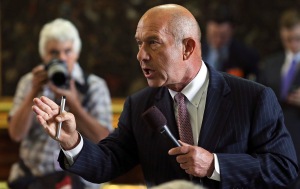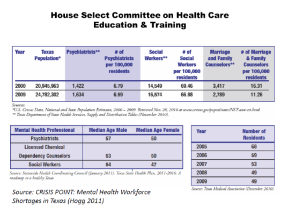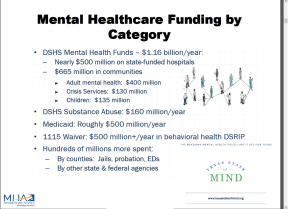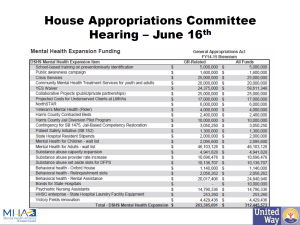Last week we talked about the consequences about not investing in mental health. It makes sense to ask: So who are the investors? Or more accurately, who is making the decisions about how and how much our state spends on mental health care? It turns out, for those of us in Greater Houston, we have Legislators in positions of leadership in the Texas House and Senate. In this episode, we look at the Legislators in position to make the financial decisions we will be watching in 2015.
This is Minding Houston, I’m Bill Kelly.
There is always a lot of focus on the “Big 3” of Texas Government. The Governor, the Lt. Governor, and the Speaker of the House get most of the press when it comes to big legislative initiatives. However it is the individual legislators who make up the committees who play a very large role in determining which areas of the budget are funded and which policy are passed.
Greater Houston is very fortunate to have a number of our elected officials in well placed position to affect what the Legislature does for mental health. To start off, newly appointed House Appropriations Chair John Otto now holds one of the most powerful positions in the entire Legislature. Elected to Represent Dayton, Texas in House District 18, the heart of his district is only 35 miles from downtown Houston. Rep. Otto is the first CPA to ever head the budget writing committee and clearly wants to let the numbers do the talking. When laying out the budget to the new members of the Appropriations Committee, Chairman Otto had the Legislative Budget Board feature mental health funding during the Overview on House Bill 1.
“… moving on to page nine on mental health funding. House Bill One as introduced includes $2.6 billion in general revenue and $3.4 billion in all funds for behavioral health and substance abuse services. That goes to 17 agencies across five articles …”
Below, you can see the slides lawmakers were looking at detailing where House Bill 1, first one showing how mental health services are funded across 17 state agencies. The next slide deals specifically deals with the mental health and substance abuse funding in the Department of State Health Services.
- Mental Health and Substance Abuse General Revenue Funds
- Statewide Behavioral Health Funding
Chairman Otto can choose whatever portion of the budget he would like to present when it comes to these overview hearings. The fact he included mental health funding shows his own focus on the issues and will hopefully resonate with members of his committee.
Sitting beside Chairman Otto is the Vice Chair of the Appropriations Committee Sylvester Turner. Rep. Turner is a 25 year house veteran and is regarded as one of the most knowledgeable members of the Legislature when it comes to the Appropriations Process.
During the testimony from staff with the Legislative Budget Board, Rep. Turner noticed that the base funding in House Bill 1 is predicted to generate a waiting list of over 900 adults statewide for mental health services.
Rep. Turner: “So in comparison to what we did in the last biennium to this biennium what is the increase or decrease or are the things the same?”
“Across all of the agencies, again on slide 10, you can see is a $200,000 dollar general revenue increase so approximately the same as 1415 and then the $61 million dollar decline in all funds.”
Rep. Turner: “And then there is a waiting? Because last time we eliminated the waiting list for juveniles and adults, did we not?”
“Yes sir, I believe the waiting list for adults and children were funded last time.”
Rep. Turner: “Okay and with regards to where we are today the waiting list is returning?”
“Yes sir.”
Rep. Turner: “And the necessary cost to eliminate the waiting list there would be what?”
Shannon Sabine: “The estimated amount to fund the adult waiting list would at the moment would be about $13 million.”
Remember from our previous blog entries how Harris County is very much affected when the state is unable to serve those on the waiting list, having almost 30% of the wait list before services were funded in the last session.
Turner has filed House Bill 1393 that helps counties like Harris in funding Home and Community Based Services that provide medical assistance to persons with severe and persistent mental illness who are at the greatest risk of institutionalization. I spoke with Rep. Turner about this in Austin:
Bill Kelly: “I just caught Representative Sylvester Turner, Vice Chair of the Appropriations Committee walking off the house floor. Representative Turner, thank you for talking with us. You filed a legislation that is going to help Harris County really target the number of individuals who are at the risk of institutionalization by providing more medical assistance for health services. Could you talk a little bit about that bill?”
Rep. Turner: “Yes, there is such as tremendous need. People want to stay at home. They want that independence, that independent living and it enhances their own quality of life. So what is intended by the bill is to provide the necessary resources to keep them at home, to provide them with that support that’s needed to keep them at home, so we don’t have to put them in an institutionalized setting. That really cuts against their own quality of life and also not even beneficial or advantageous for the family members as well. And what I have found in my own personal experiences is that if you can keep people at their homes, in their communities, within that environment it’s just better for everyone around, for them as well as their family members and friends. “
Last week, subcommittees were named so that the 27 member House Appropriations Committee could focus closely on specific topic areas, often called Articles, in the budget. The Subcommittee for Health and Human Services that makes up Article II of the budget contains some very familiar faces for Harris County.
 Rep. Sarah Davis returns to this committee for her second straight session. Last session, she oversaw the Department of State Health Services budget that increased funding for behavioral health services by over $300 million. Rep. Davis represents the Texas Medical Center and has many constituents that work in health related fields. I spoke with her in Austin at a Subcommittee meeting on Wednesday.
Rep. Sarah Davis returns to this committee for her second straight session. Last session, she oversaw the Department of State Health Services budget that increased funding for behavioral health services by over $300 million. Rep. Davis represents the Texas Medical Center and has many constituents that work in health related fields. I spoke with her in Austin at a Subcommittee meeting on Wednesday.
Joining her is Rep. Armando Walle who will be serving on the Appropriations Committee for the 1st time since being elected in 2008. Rep. Walle meet with MHA in our offices during the interim to discuss state mental health policy and understands the needs of his district in getting access to services.
Kelly: “I’m here with Representative Armando Walle before the sub-appropriations committee meeting for Article II. Representative Walle, you visited with us this summer and talked about your concern with your constituents about access to services, not only for the people of your district but particularly with Veterans and your personal experiences that you have. Now that you are on the committee do you look forward to being able to address a number of those issues?”
Rep. Walle: “That is correct. Being on the committee, reviewing all the budget, PowerPoints, looking at where the money is going, item by item. Mental health is a huge issue, particularly for access in my district. Obviously, we’ve done better recently, but I think we can do a lot more to help folks access mental health because sometimes it is a taboo in a lot of our communities where they don’t want to seek out help. And we need to inform our folks, particularly low income communities, that it is okay to seek help. One example is the military, matters where military personnel come from combat, suffering from PTSD and they might not know it. Dear friends who have suffered from it, family members who come back from war and need mental health services; that is a huge issue for my district, particularly young kids that have disciplinary issues or be overrepresented in the juvenile justice system. So it runs a gambit, but we do need more access to effective treatment, diagnosis for our young kids.”
Over on the Senate side of the building, we have a number of Legislators from Harris County looking to use their experience to help shape policy as members of the Senate Finance Committee.
First, we previously mentioned Senator John Whitmire’s service as Chair of the Criminal Justice Committee. Known as “The Dean” as the longest serving State Senator, Whitmire has represented Harris County in the Senate since 1982. His experience  will be key in securing the needed funding for community based programs.
will be key in securing the needed funding for community based programs.
Senator Joan Huffman has a background as a prosecutor and as Vice Chair of the Criminal Justice Committee and as Chair of the Senate State Affairs Committee. Last session, she authored SB 1185 with Senator Whitmire to create the Harris County Mental Health Jail Diversion Program.
During the October 2014 Texas Tribune Tribfest panel entitled “What’s Next for Mental Health?”, Senator Huffman talked about how she was able to work with her colleagues, including Finance Chair Jane Nelson, about providing more resources for mental health.
Senator Huffman: “I think it really got us thinking, what can we do in Texas to address these issues? Clearly we’ve fallen behind in treating those who are mentally ill and providing services that they desperately need. And I just think sometimes it’s an issue that everyone can understand. People want to be more informed about the issue and we had really good leadership. I served with Senator Nelson, who was the Chair of Health and Human Services. She made it a top priority and many of us followed her and made it our priority and resulted in good things happening in Texas.”
Senator Larry Taylor serves not only on the Senate Finance Committee but chairs the Senate Public Education Committee. Senator Taylor will be a key player in seeing mental health funding, such as Mental Health First Aide, is distributed to educators across the state. Last session, $5 million was allocated to train educators in Mental Health First Aide, and 8 hour program that teaches how to help people developing a mental illness or in crisis. In Harris County alone, that means 400 teachers trained in Mental Health First Aide.
Freshman Senator Paul Bettencourt is serving his first term in the Texas Senate, taking over the seat previously held by Lt. Governor Dan Patrick. Senator Bettencourt has meet with our office and from his seats on the Senate Public Education and Higher Education Committees has a very unique position to help with mental health initiatives, especially the mental health loan assistant repayment program in SB 239.
This impressive lineup has a difficult task in front of it in securing the needed resources for mental health. They will need to hear from people across Texas to make sure that mental health isn’t ignored or pushed to the side. So when and how are people reaching out to thank, educate, and persuade legislators? More on that, next time.
This is Minding Houston. I’m Bill Kelly.
Music from this episode: “Badass” and Funky Suspense” by Bensound, “Motown ton” by Ton, “Einsame Verfolger” by Melophon and Premium Music
Thank you to the Texas Tribune. To listen to the complete “What’s Next for Mental Health?” panel, visit their Soundcloud.












 Unfortunately, things haven’t improved since this report was released in 2011. One of the most respected health care groups in Texas just released a report this January that echoes many of the same concerns. In an interview with
Unfortunately, things haven’t improved since this report was released in 2011. One of the most respected health care groups in Texas just released a report this January that echoes many of the same concerns. In an interview with 






